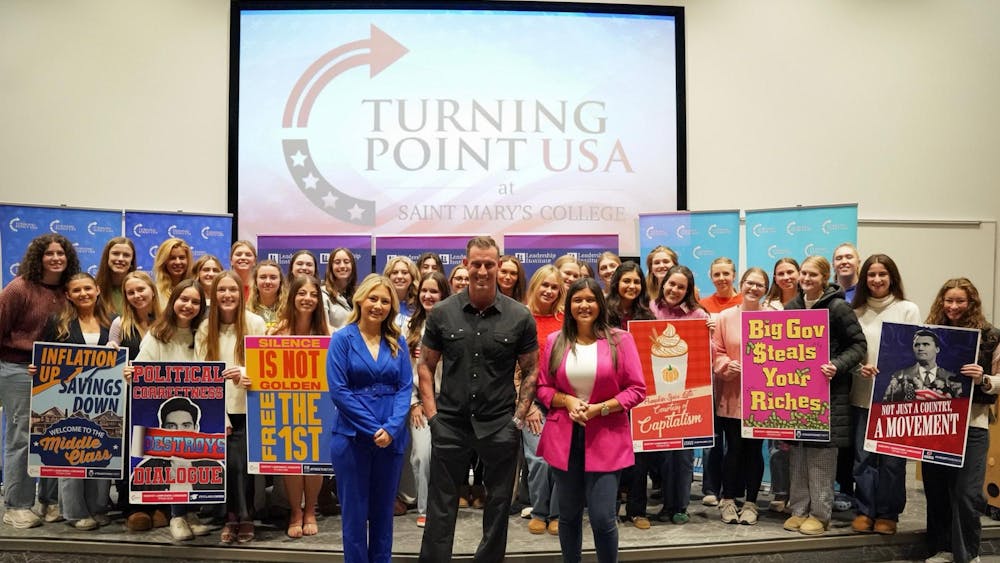When I was a freshman at Notre Dame during the 2017-18 academic year, the Notre Dame Forum hosted a conversation with Mohamedou Ould Slahi, who was wrongfully detained and tortured by the United States Government at Guantánamo Bay for fourteen years. In preparation for his talk, we were encouraged to read his book, “Guantánamo Diary.” I remember spending my winter break working through the memoir, crying as the illusion of my country’s values disintegrated for one of the first times in my life. In my discussion group at the Center for Social Concerns, the book inspired deep discussion about our failures toward each other and the world.
This Friday, the Notre Dame Forum hosted Condoleeza Rice, someone who deeply impacted Ould Slahi’s life during his fourteen years in detention, to explore the question, “What do we owe each other?” a report by the Senate Armed Services Committee in 2009 indicates that then National Security Advisor Condoleeza Rice personally conveyed the administration’s approval for torture techniques, including waterboarding, that would be used on detainees at Guantánamo Bay. Secretary Rice has defended the United States’ use of torture techniques on detainees held without trial, which would be illegal under the U.S. Constitution, arguing that it was the right thing to do.
Yet, on Friday, there was no critical conversations about imperialism, torture or human rights violations. Instead, at the beginning of the talk, when asked about the football game, Secretary Rice quipped, “Fr. Dowd, I said no hard questions.” This rang true for the rest of their conversation, which did not include an opportunity for Q&A from the audience. The talk focused on the global influence of the United States, with Rice arguing that “great powers don’t mind their own business, they try to shape the world.” While I firmly disagree with the colonial notion that the United States should “shape the world,” I can think of many examples of the ways that it has. Many of these examples are violent and disruptive and some tie back to the decisions Secretary Rice made during her time in government. For example, some of the same techniques authorized under Rice’s tenure are being used by the Israeli government, with the support of the U.S. Government, to torture Palestinians today.
A UN Press Release from August 5, 2024 reports that “Countless testimonies by men and women speak of detainees in cage-like enclosures, tied to beds blindfolded and in diapers, stripped naked, deprived of adequate healthcare, food, water and sleep, electrocutions including on their genitals, blackmail and cigarette burns. In addition, victims spoke of loud music played until their ears bled, attacks by dogs, waterboarding, suspension from ceilings and severe sexual and gender-based violence.” A B’Tselem report “Welcome to Hell” further details the torture networks of Israeli prisons, with many parallels to the American tradition of torture and wrongful imprisonment that persists to this day at Guantánamo Bay.
After this talk, I am left wondering what we really owe each other. I can think of no better image than the one Mohamedou offers at the end of his account of Guantánamo Bay, where he says that “he holds no grudge against any of the people he mentions in this book … and that he dreams to one day sit with them around a cup of tea, after having learned so much from one another.” In the updated edition of his book, he says, “I want to repeat and affirm this message here, and to say that now that I am home, that dream is also an invitation. The doors of my house are open.” To me, this is deeply compelling. Sitting down to tea requires that we recognize the humanity in each other and take accountability for the wrongs committed in our names.
So, what does the U.S. owe to the world? An immediate end to its support for torture, wrongful imprisonment and violence of all kinds against civilians, including by ending its military aid to Israel and closing Guantánamo Bay. What does Notre Dame owe to its students? Let’s start with the ability to ask critical questions.
Elsa Barron
first-year Ph.D. student
Oct. 15










